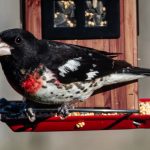Raccoons pose a significant threat to chickens due to their intelligence, dexterity, and predatory nature. These nocturnal animals possess problem-solving skills and nimble paws that enable them to manipulate various fastening mechanisms, making chicken coops vulnerable to intrusion. Once raccoons identify a reliable food source, they tend to return repeatedly, creating an ongoing risk for poultry owners.
In addition to direct predation, raccoons can transmit diseases and parasites to chickens, including rabies, distemper, avian influenza, roundworms, and mites. These health hazards can affect both the poultry and potentially humans. Raccoons are opportunistic feeders and will consume eggs, chicks, and adult birds, leading to substantial losses for chicken keepers.
The threat from raccoons extends beyond chickens to other small pets and property. Their scavenging behavior can result in damage to gardens, trash receptacles, and buildings. Raccoons’ sharp claws and teeth can easily penetrate common coop materials like chicken wire and wood, necessitating robust fortification measures.
Understanding the multifaceted risks posed by raccoons is crucial for implementing effective protective strategies to safeguard chickens and other vulnerable assets.
Table of Contents
- 1 Fortifying the coop: Tips for securing your chicken coop from raccoon attacks
- 2 Eliminating food sources: How to prevent raccoons from being attracted to your property
- 3 Using deterrents: Effective methods for keeping raccoons away from your chickens
- 4 Nighttime protection: Strategies for safeguarding your chickens while they roost
- 5 Monitoring and maintenance: Regular checks to ensure raccoons are kept at bay
- 6 Seeking professional help: When to call in experts for raccoon control and removal
- 7 FAQs
Key Takeaways
- Raccoons pose a threat to chickens as they are skilled predators and can easily break into coops to prey on birds.
- Fortify your chicken coop by using sturdy materials, securing all openings, and installing locks or latches that raccoons cannot manipulate.
- Eliminate food sources such as spilled chicken feed, garbage, and fallen fruits to discourage raccoons from being attracted to your property.
- Use deterrents like motion-activated lights, sprinklers, and predator urine to keep raccoons away from your chickens.
- Implement nighttime protection measures such as locking chickens in a secure coop, using automatic door closers, and installing motion-activated alarms to safeguard them while they roost.
- Regularly monitor and maintain your coop for any signs of raccoon activity, and promptly address any potential entry points or weaknesses in the structure.
- Seek professional help from wildlife control experts if raccoon infestation becomes unmanageable or if you are unable to safely remove them from your property.
Fortifying the coop: Tips for securing your chicken coop from raccoon attacks
Building a Raccoon-Proof Coop
Firstly, ensure that the coop is constructed with sturdy materials such as heavy-duty wire mesh and solid wood to prevent raccoons from breaking in.
Regular Maintenance and Inspection
Regularly inspect the coop for any signs of wear and tear, and promptly repair any damaged areas to prevent raccoon intrusion. In addition to the physical structure of the coop, it’s important to secure all entry points with locks and latches that are raccoon-proof. Raccoons are adept at opening doors and windows, so consider using locks that require dexterity or installing predator-proof latches that are specifically designed to keep raccoons out.
Securing the Roof and Surrounding Area
It’s also crucial to secure the roof of the coop with strong wire mesh or netting to prevent raccoons from gaining access from above. Clear away any overgrown vegetation, brush piles, or debris that could provide cover for raccoons as they approach the coop. By keeping the area around the coop clear and open, you can reduce the likelihood of raccoon attacks and make it more difficult for them to approach undetected.
Protecting Your Flock
By fortifying the coop with these measures, you can effectively deter raccoons from breaking in and preying on your chickens. Implementing these tips for securing your chicken coop from raccoon attacks is crucial in protecting your flock from these cunning predators.
Eliminating food sources: How to prevent raccoons from being attracted to your property

Preventing raccoons from being attracted to your property is an important step in minimizing the risk of raccoon attacks on your chickens. Raccoons are opportunistic feeders and will be drawn to properties where food sources are readily available. By eliminating these food sources, you can reduce the likelihood of raccoons being attracted to your property and posing a threat to your flock.
One of the most effective ways to prevent raccoons from being attracted to your property is to secure all sources of food, including pet food, bird feeders, and garbage bins. Store pet food indoors, use raccoon-proof bird feeders, and secure garbage bins with tight-fitting lids to prevent raccoons from accessing these food sources. Furthermore, it’s important to keep your property free of fallen fruits, nuts, and other food items that may attract raccoons.
Regularly clean up any fallen produce from trees or bushes in your yard to reduce the availability of food for raccoons. Additionally, consider installing motion-activated lights or sprinkler systems around the perimeter of your property to deter raccoons from approaching. These deterrents can startle raccoons and make them think twice about venturing onto your property in search of food.
Another effective way to prevent raccoons from being attracted to your property is to remove or secure potential den sites. Raccoons are known for nesting in attics, crawl spaces, and under decks, so it’s important to seal off these areas to prevent them from taking up residence on your property. By eliminating potential den sites and securing all sources of food, you can significantly reduce the likelihood of raccoons being attracted to your property and posing a threat to your chickens.
Using deterrents: Effective methods for keeping raccoons away from your chickens
Using deterrents is an effective method for keeping raccoons away from your chickens and preventing potential attacks on your flock. There are several types of deterrents that can be used to discourage raccoons from approaching the coop and reduce the risk of predation. One of the most common deterrents is the use of motion-activated devices such as lights, sirens, or sprinkler systems.
These devices startle raccoons when they approach the coop, making them think twice about attempting to gain access to your chickens. Another effective deterrent is the use of scent repellents that are unpleasant to raccoons. There are various commercial repellents available that contain natural ingredients such as predator urine or hot pepper extract, which can deter raccoons from approaching the coop.
Additionally, you can create homemade repellents using ingredients like garlic, vinegar, or ammonia, which emit strong odors that raccoons find offensive. By applying these scent repellents around the perimeter of the coop, you can create a barrier that discourages raccoons from getting too close. Furthermore, installing physical barriers such as electric fencing or predator-proof hardware cloth can be an effective way to keep raccoons away from your chickens.
Electric fencing delivers a mild shock when touched, deterring raccoons from attempting to breach the perimeter of the coop. Predator-proof hardware cloth can be installed around the base of the coop and run several feet outward to prevent raccoons from digging underneath the structure. By using these deterrent methods, you can effectively keep raccoons away from your chickens and minimize the risk of predation on your flock.
Nighttime protection: Strategies for safeguarding your chickens while they roost
Safeguarding your chickens while they roost at night is crucial for protecting them from potential raccoon attacks. Raccoons are primarily nocturnal animals and are most active during the night when chickens are roosting in their coop. Implementing strategies for nighttime protection is essential in ensuring the safety and well-being of your flock.
One effective strategy is to securely lock all doors and windows of the coop at dusk when chickens have returned to roost. Raccoons are known for their ability to open latches and locks, so it’s important to use predator-proof hardware that is specifically designed to keep them out. Another important aspect of nighttime protection is providing adequate lighting around the perimeter of the coop.
Motion-activated lights or solar-powered lights can help deter raccoons from approaching the coop by illuminating the area when they sense movement. This not only startles raccoons but also makes it easier for you to monitor any potential threats to your flock during the night. Additionally, consider installing surveillance cameras near the coop to keep an eye on any nocturnal activity and ensure that your chickens are safe while they roost.
Furthermore, consider using guard animals such as dogs or geese to protect your chickens from raccoon attacks during the night. Dogs are natural predators of raccoons and their presence alone can deter these predators from approaching the coop. Geese are also known for their aggressive behavior towards intruders and can alert you to any potential threats by honking loudly when they sense danger.
By implementing these strategies for nighttime protection, you can safeguard your chickens while they roost and minimize the risk of raccoon attacks on your flock.
Monitoring and maintenance: Regular checks to ensure raccoons are kept at bay

Inspecting the Coop’s Security
Conducting regular checks allows you to identify any weak points in the coop’s security and promptly address them before they become entry points for raccoons. Inspect all doors, windows, vents, and other entry points for signs of damage or wear and tear, and make any necessary repairs or reinforcements as needed.
Monitoring Raccoon Activity
In addition to physical inspections, it’s essential to monitor any signs of raccoon activity around the coop, such as tracks, droppings, or attempts at entry. By staying vigilant and regularly checking for these signs, you can take proactive measures to prevent raccoons from gaining access to your chickens. Consider setting up motion-activated cameras near the coop to capture any nocturnal activity and help you identify potential threats.
Maintaining a Raccoon-Free Environment
Furthermore, maintaining a clean and tidy coop area is crucial for minimizing the risk of attracting raccoons. Keep feeders and waterers inside the coop at night to prevent them from becoming a food source for raccoons. Additionally, promptly remove any spilled feed or scattered grains around the coop area that may attract these predators.
Seeking professional help: When to call in experts for raccoon control and removal
In some cases, dealing with raccoon control and removal may require professional expertise to effectively address the issue and ensure the safety of your chickens. If you have persistent problems with raccoons gaining access to your coop despite implementing various deterrents and fortifying measures, it may be time to call in experts for assistance. Professional wildlife control specialists have the knowledge and experience to effectively deal with raccoon infestations and implement long-term solutions for keeping them away from your property.
Wildlife control experts can conduct a thorough assessment of your property to identify potential entry points and areas of vulnerability that may be attracting raccoons. They can then recommend and implement appropriate measures such as exclusion barriers, trap-and-release programs, or habitat modification techniques to deter raccoons from approaching your coop. Additionally, wildlife control specialists have access to specialized equipment and tools that can be used to safely remove raccoons from your property without causing harm to them or other wildlife.
Furthermore, seeking professional help for raccoon control and removal ensures that all legal regulations and ethical considerations are adhered to throughout the process. Wildlife control experts are knowledgeable about local laws regarding trapping and relocating wildlife, as well as best practices for humane removal methods. By enlisting the help of professionals, you can have peace of mind knowing that the issue will be handled responsibly and effectively without compromising the well-being of the raccoons or your chickens.
In conclusion, understanding the threat that raccoons pose to your chickens is crucial in taking proactive measures to protect your flock from these cunning predators. Fortifying the coop with sturdy materials, secure locks, and physical barriers is essential for preventing raccoon attacks on your chickens. Eliminating food sources and using deterrents can help reduce the likelihood of attracting raccoons to your property in the first place.
Implementing strategies for nighttime protection ensures that your chickens remain safe while they roost, while regular monitoring and maintenance help keep raccoons at bay. In cases where dealing with raccoon control becomes challenging, seeking professional help is advisable for effective removal and long-term solutions. By taking these proactive measures, you can safeguard your chickens from potential threats posed by raccoons and ensure their safety and well-being on your property.
If you’re looking for ways to protect your chickens from predators like raccoons, you may also be interested in learning about the best kind of coop for your chickens. Check out this article on what kind of coop is best for chickens to ensure your feathered friends have a safe and secure home.
FAQs
What are some effective ways to keep raccoons from killing my chickens?
Some effective ways to keep raccoons from killing your chickens include securing your coop with strong locks, using hardware cloth instead of chicken wire, installing motion-activated lights or sprinklers, and keeping food sources like garbage cans and pet food indoors.
Why do raccoons pose a threat to chickens?
Raccoons are natural predators and are known to attack and kill chickens for food. They are also known to be quite intelligent and can easily break into chicken coops if not properly secured.
What are some signs that raccoons are targeting my chickens?
Some signs that raccoons are targeting your chickens include missing or injured chickens, evidence of forced entry into the coop, and tracks or droppings around the coop area.
Are there any natural deterrents for raccoons?
Some natural deterrents for raccoons include using strong-smelling substances like ammonia or predator urine around the coop, as well as planting thorny bushes or installing prickly surfaces around the coop to discourage raccoons from approaching.
Is it legal to trap and relocate raccoons?
Laws regarding the trapping and relocation of raccoons vary by location, so it’s important to check with local wildlife authorities before attempting to trap and relocate raccoons. In some areas, it may be illegal to relocate raccoons, and they may need to be euthanized instead.
Meet Walter, the feathered-friend fanatic of Florida! Nestled in the sunshine state, Walter struts through life with his feathered companions, clucking his way to happiness. With a coop that’s fancier than a five-star hotel, he’s the Don Juan of the chicken world. When he’s not teaching his hens to do the cha-cha, you’ll find him in a heated debate with his prized rooster, Sir Clucks-a-Lot. Walter’s poultry passion is no yolk; he’s the sunny-side-up guy you never knew you needed in your flock of friends!







